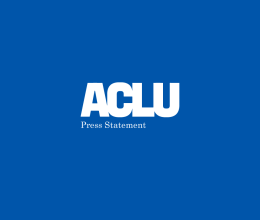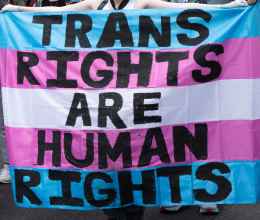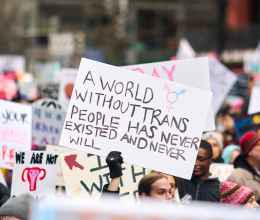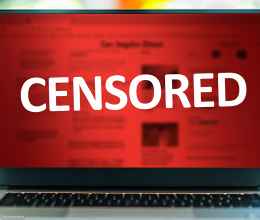
Getting an education isn't just about books and grades - students are also learning how to participate fully in the life of this nation. (Because the future's in their hands!)
But in order to really participate, students need to know their rights.
The U.S. Constitution is a roadmap to law in the United States. This guide somes with amendments, known as the Bill of Rights. The Bill of Rights guarantees that the government can never deprive people in the U.S. of certain fundamental rights including the right to freedom of religion, free speech, the due process of law and freedom of expression. Many federal and state laws grant people additional rights, as well.
The Bill of Rights applies to young people AND adults.
WHAT DOES FREEDOM OF EXPRESSION ACTUALLY MEAN?
The First Amendment guarantees the right to free expression and free association, which means that the government does not have the right to forbid citizens from saying what they like and writing what they like. This allows people to form clubs and organizations, and take part in demonstrations and rallies.
COMMON QUESTIONS:
DO I HAVE A RIGHT TO EXPRESS MY OPINIONS AND BELIEFS IN SCHOOL?
Yes. In 1969 in Tinker v. Des Moines Independent Community School District the Supreme Court held that students in public schools - which are run by the government - do not leave their First Amendment rights at the schoolhouse gate. This means that you can express your opinions orally and in writing - in leaflets or on buttons, armbands or T-shirts.
You have a right to express your opinions as long as you do so in a way that doesn't "materially and substantially" disrupt classes or other school activities. If you hold a protest on the school steps and block the entrance to the building, school officials can stop you. They can probably also stop you from using language that they think is "vulgar or indecent," so watch out for the dirty words, OK?
Also, school officials may not censor only one side of a controversy. If they permit an article in the official school paper that says that premarital sex is bad, they may not censor an article that says premarital sex is good.
WHAT ARE WE ALLOWED TO SAY IN A SCHOOL PAPER?
Keep in mind - private schools have more leeway to set their own rules on free expression than public schools do.
It depends on whether the school is paying for producing the paper. If it is a completely student-run paper that you want to hand out in school, the school may not censor what you say or stop you from handing it out as long as the paper is not "indecent" and you do not "materially and substantially" disrupt school activities. (The school may place reasonable limits on the "time, place or manner" of handing it out.) The same rule applies to leaflets or buttons that you have created and paid for.
In the official school paper, however, you might have a problem publishing an article that discusses important but controversial issues like sex education, condom distribution, or drug abuse. That's because of a 1988 Supreme Court decision, Hazelwood School District v. Kuhlmeier. It said public school administrators can censor student speech in official school publications or activities -- like a school play, art exhibit, newspaper or yearbook -- if the officials think students are saying something "inappropriate" or "harmful" even if it is not vulgar and does not disrupt.
Some states -- including Colorado, California, Iowa, Kansas and Massachusetts -- have "High School Free Expression" laws that give students more free speech rights than the Constitution requires. Check with your local ACLU to find out if your state has such a law.
CAN WE SLAM A REALLY BAD TEACHER IN THE SCHOOL PAPER?
In your own publication, it's your right to criticize how the people who run your school do their jobs. But you can't print something about your teacher that you know or should know isn't true that makes him or her look bad. That might be libel, and that could get you into trouble.
IS MY SCHOOL ALLOWED TO HAVE A DRESS CODE?
It depends on what state you live in. In some states, students can wear their hair any way they want as long as it's not a safety hazard (like if your hair is very long, you have to tie it back during a science experiment). Courts in other states allow school hair codes - and where hair codes are permitted, so are dress codes. Check with your local ACLU about the laws in your state.
If you think your school's dress codes and hair codes are unfair and you want to challenge them, be aware that a court probably won't overturn the codes unless the judge finds that they're really unreasonable, or that they're discriminatory.
DO I HAVE TO SAY THE PLEDGE OF ALLEGIANCE?
No. The Supreme Court has held that it is just as much a violation of your First Amendment rights for the government to make you say something you don't want to say as it is for the government to prevent you from saying what you do want to say. You have a right to remain silently seated during the pledge.
CAN THE SCHOOL LIBRARY REFUSE TO STOCK CERTAIN BOOKS?
This is a very complicated issue. Schools certainly have the right to pick the books they think have the greatest value for their students and to reject those that they believe have little value. On the other hand, if the school refuses to stock a book for "narrowly partisan or political," reasons - i.e., they just don't agree with the authors' viewpoints - that's censorship and censorship is unconstitutional. In a 1982 case called Island Trees v. Pico, the Supreme Court ruled that school boards can't remove books from a school library just because they don't agree with their content. But in many communities around the country, school administrators and librarians are under heavy pressure from religious and other groups to censor what we read and study.
If you believe that your school is censoring books because of their viewpoints, you, your teachers and the school librarian can challenge book censorship at your school or in court. The freedom to read is the freedom to think - and that's totally worth fighting for!
It can hardly be argued that either students or teachers shed their constitutional rights to freedom of speech . . . at the schoolhouse gates."
--U.S. Supreme Court, Tinker v. Des Moines (1969)
Most people spend a big part of their life in school. Don't spend that time wondering, speak up!
Produced by the ACLU Department of Public Education. 125 Broad Street, NY NY 10004. For more copies of this or any other Sybil Liberty paper, or to order the ACLU handbook The Rights of Students or other student-related publications, call 800-775-ACLU or visit us at: aclu.org




